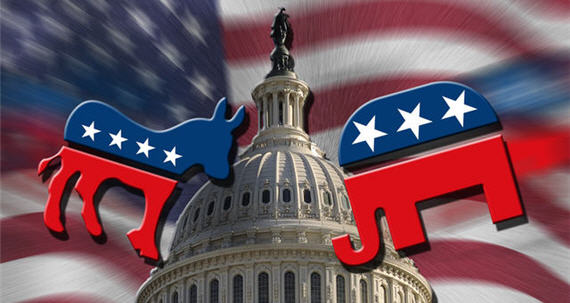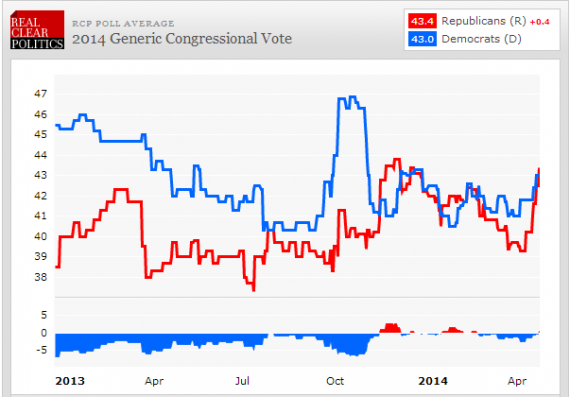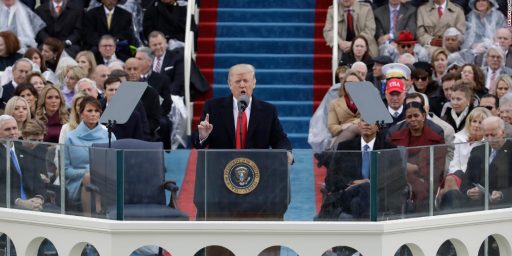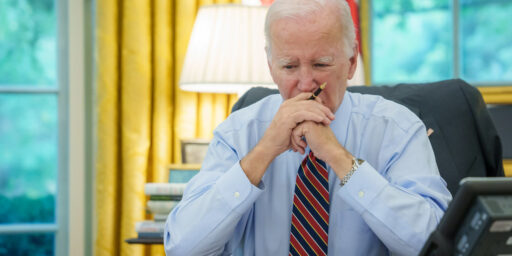Republicans Seem To Be Surging In Generic Ballot
Good news for Republicans.
A new Pew Research/USA Today poll suggests good news for Republicans, and bad news for Democrats, heading into the 2014 midterms:
WASHINGTON — Democrats hoping improvements in the economy’s course and the Affordable Care Act’s implementation would level the playing field for November’s elections should brace themselves.
A nationwide USA TODAY/Pew Research Center Poll shows the strongest tilt to Republican candidates at this point in a midterm year in at least two decades, including before partisan “waves” in 1994 and 2010 that swept the GOP into power. Though Election Day is six months away — a lifetime in politics — at the moment, Democrats are saddled by angst over the economy, skepticism about the health care law and tepid approval of the president.
“People should start opening their eyes and seeing we’re not on track,” says Brenna Collins, 32, a small-business owner from Kasson, Minn., who was among those surveyed. “Not exactly saying Republicans are right but that things need to change.”
By more than 2-1, 65%-30%, Americans say they want the president elected in 2016 to pursue different policies and programs than the Obama administration, rather than similar ones.
In the 2014 elections, registered voters are inclined to support the Republican candidate over the Democrat in their congressional district by 47%-43%. That 4-percentage-point edge may seem small, but it’s notable because Democrats traditionally fare better among registered voters than they do among those who actually cast ballots, especially in low-turnout midterms.
“It’s huge,” says former Virginia congressman Tom Davis, who twice chaired the Republican congressional campaign committee. He says its potential impact is tempered only because House Republicans already hold a 233-seat majority, including most swing seats. Even so, the friendly landscape, if it holds, could help the GOP bolster its majority in the House and gain the six seats needed to claim control of the Senate.
Their lead in the generic congressional ballot is the biggest at this point for Republicans in the past 20 years. In 1994, when the GOP would gain control of the House and Senate, Democrats held a 2-point advantage in the spring of the election year. In 2010, when Republicans would win back the House, the two sides were even.
Admittedly, as the chart accompanying the article shows, the GOP lead in the General Congressional Ballot is not as high as it was for Democrats in 2006, when they gained 31 seats and took control of the House, or in 1998 when they gained five seats and set in course a chain of events that led to Newt Gingrich losing his position as Speaker of the House in the Republican leadership elections later that months. Additionally, the RealClearPolitics average for Generic Congressional Ballot polls shows the GOP with just a .4 point lead. However, the trend in that poll seems to be showing real Republican momentum over the past month or so:
For be fair, the Generic Ballot is not always the best measurement of political sentiment when it comes to individual races in the House and Senate. Rather than looking at the state of specific races, these polls aggregate national opinion in a way that may not necessarily correlate with how the campaigns of individual candidates are actually doing. It’s also not clear what this kind of poll portends for the Senate in particular, which is where the only real action is in the 2014 midterms since there’s essentially no chance that control of the House of Representatives is up for grabs. Furthermore as the chart above shows, this is a poll that tends to fluctuate quite a lot, and it will likely fluctuate some more between now and late summer when most voters actually start paying attention to the races in their states and districts. That being said, there is definitely an historical connection between this poll and the battle for control of Congress. So, at the very, least these numbers should elate Republicans, and cause no small degree of concern for Democrats.
Not surprisingly, the biggest issue that seems to be impacting voters at the moment is the economy:
Voters say the most important issue affecting their vote for Congress this fall is the jobs situation, cited by 27% of those surveyed. Health care is first for 21%, followed by the federal budget deficit, named by 19%. Only education and national security also break into double digits.
Though economists report an economic recovery is underway, most people say they aren’t feeling its benefits. By more than 2-1, 40%-17%, they assess the nation’s economic conditions as poor, not excellent or good. That’s essentially unchanged from a year ago.
Nor is there evidence of increased optimism about the future. One in four predict economic conditions will be better a year from now, but another one in four predict they will be worse. Half don’t expect it to change.
“I think the economy is getting better, but slowly — too slowly,” says Ronald Moore, 65, of San Francisco. “It’s just at a standstill.”
(…)
Most of those surveyed say their own families aren’t prospering: 39% rate their financial situation as “only fair” and 23% call it poor. They do see a bit of hope on the horizon. Looking ahead, 59% say things are getting better for them, though most say only a little better. One in four say things are getting worse.
“My situation has improved,” says John Konicek, 41, an engineer from Estero, Fla. “I have a secure job, and my home (value) has increased.”
“Food out here is expensive; gas is going up; rent is going up; I don’t get a raise,” frets Edward Trivette, 55, of Forgan, Okla. He says he often can’t afford to buy the sort of meat he processes at the plant where he works. He doesn’t see the federal government doing much to help. “It’s very, very frustrating when you try to make a living for your family and Congress and Washington is against you.”
Perhaps the most disturbing sign for Democrats: By 43%-39%, Americans say following the economic policies of Republican congressional leaders would do more to strengthen the economy over the next few years than following the policies of the Obama administration.
And the Affordable Care Act continues to perform poorly:
Public views of the 2010 health care law have changed little over the past several months. Currently, 55% disapprove of the Affordable Care Act and 41% approve. In September, before the launch of the online health care exchanges, 53% disapproved and 42% approved.
Republicans continue to be largely united in their opposition of the health care law — 88% disapprove and 10% approve of it. Among Democrats, about three-in-four (73%) approve, while roughly one-in-four (24%) disapprove of the law. Independents remain mostly opposed to the law, with 57% disapproving and about four-in-ten (39%) approving of it.
(…)
As in earlier surveys, opposition to the law is more intense than support: 43% of the public disapproves of the law very strongly and 11% disapprove of it not so strongly. By comparison, 26% approve of the law very strongly while 13% approve of it not so strongly.
Republicans and Republican leaners who agree with the Tea Party have a particularly negative assessment of the law. Almost all Tea Party Republicans (97%) disapprove of the law and about nine-in-ten (91%) disapprove very strongly. Among non-Tea Party Republicans, 83% disapprove and 67% disapprove very strongly.
It’s always possible, of course, that public attitudes on the issues will change. The economy could begin to improve at more rapid pace, for example, or the Administrations three year long propaganda campaign in favor of the Affordable Care Act could finally begin to pay off in the polls. However, those are things that Democrats have been hoping would happen for some time now and they’ve been consistently disappointed, so it’s probably safer to assume that they won’t happen than that they will. There could also be external factors that will have an impact on the course of the election, including but not limited missteps by Republican candidates that have an impact on the fortunes of the party as a whole. As things stand now, though, the trends are all moving in the GOP’s direction.








When it comes to the American voter the bar is set low.
I read a political scientist a few years ago who talked about the deep, dark secret in Poly Sci that no one talks about, although all political scientists know it – the electorate are a box of rocks.
The thing is, she’s right. But I wish she’d give some thought to why, and when it started. I can make a pretty good case it’s the result of Republican policies and started in the ’80s, when we started electing Republicans regularly. But the GOP strategy of obstructing Obama at every turn, then blaming him for the results, is working.
@al-Ameda: the irony is staggering!
If anything, they show dissatisfaction with the establishment, since named Republicans in recent elections in my experience poll lower than their generic counterpart. Sometimes that’s just due to low name recognition though.
You could have went with “marketing” or “messaging” there, but you picked “propaganda.” Intriguing word choice.
@bill:
Not sure about irony, Bill. However one look at the House of Representative majority tells you all you need to know about general quality of the electorate.
The Democrats are lucky that the election isn’t today and that rather than pitting “generic Democrat” against “generic Republican” actual live candidates run against one another. Democrats have tended to do better under those circumstances.
@gVOR08:
Yup, everyone’s stupid except us.
Both parties believe it, and use it to explain why people don’t always vote for them. And this is one example where the equivalence really isn’t false – you need only go onto various websites like salon or nationalreview to hear many commentators from both sides mourning the stupidity of voters (typically after their team has lost an election).
My own take is that voters aren’t nearly as stupid as pundits (again on both sides) think they are – they’re often cynical because of all the hypocrisy and lying that comes down every political pipe, and assume that politicians are lying to them with almost every statement (arguably with reason – the chances are if a politician says the sky is blue you’re well off going outside to make sure it isn’t currently cloudy).
@al-Ameda:
Actually you get the same answer by looking at every elected body (including the President) – most people rarely get a chance to vote for their preferences, its almost always trying to choose the least awful selection from a horrible menu.
Right now I’d say the Democrats are terrible, but the GOP is considerably worse. But I don’t kid myself that I’m smarter than people who disagree with me (in fact I personally know several GOP voters who are considerably smarter than I am – yes, probably not setting the bar too high – and smarter than most of the public judging by their exceptional careers in professions requiring definite intelligence).
@george: It’s not a question of “smart”, it’s an issue of inattention.
Also, George Lakoff writes that conservatives see things in terms of direct causation while liberals are more prone to seeing complex causation. He explains it’s not that conservatives aren’t perfectly able to think through why things happen, it’s just not the default way they look at the world.
@george:
Mine’s not much different – I just presume people don’t pay that much attention. There’s a lot of crap I could be doing other than reading a political blog.
In your basic national news program, there isn’t much time devoted to the intricacies of parliamentary procedure and how one party or another can game the system to produce blame for the other party’s apparent failure. It’s like kabuki, where everyone when they bother to glance at the news sees the hulking actor in colorful clothes and makeup, but doesn’t gaze long enough to see the stagehands in all black running around.
They’re not dumb. There’s just no time.
Edit: Or what gVOR08 said right above me.
Lolwhut?
What I have noticed is a relentless propoganda campaign against the ACA mounted by the Koch Brothers , Fox News, and right wing talk radio, paired with a massive resistance campaign by the REpublicans in Congress and at the state level. Faced with that, the Democrats have mounted a a tepid response that included only a couple of pro-ACAS ads so far. In particular, the Obama Administration and the liberals have had a touching faith in the ability of the ACA to sell itself. The Obama Administration seems to have thought, “All we need to do is to roll out and implement the program, and people will love it.” The liberals seems to have thought , “All we have to do is to carefully explain the program, with lots of charts and numbers, and the public will agree its working”.
The right wing have counmtered this simply by laying their a$$ off for five years. So far this simple approach has worked.Goebbels really was right: “A lie repeated often enough becomes a truth.”This has frustrated the Ezra Klien crowd. Sighs Sarah Kliff:
Despite the facts, America has convinced itself Obamacare is a disaster
All of this shows that its not enough that the facts are on your side. The ACA must not only be a success: you have to create the image of success. In short, the Democrats have to do a much better job of messaging.The ACA needs much more cowbell.
The economy also is key here . If we see six more months of good job reports, the Democrats will hold the Senate. If they don’t , they won’t. The good thing is the Republicans have run out of ways to sabotage the economy, so I have hope.
Yeah but now it’s Obama’s turn:
The hilarious part is that people like stonetools believe it’s merely a “messaging” problem.
http://www.reviewjournal.com/politics/own-small-business-brace-obamacare-pain
@Dave Schuler:
And that the Pew poll isn’t the electorate.
Don’t get me wrong, I take Pew seriously, but their polls are really erratic. In 2008, they had Obama leading McCain by 16 points in late October. Then, magically, 10 points of that lead disappeared in a week.
Aggregates of the polls tell us that the generic ballot is approximately tied, as you say. ABC and NBC both have polls out covering the same period that show a 1 point lead (ABC) or a tied race (NBC), which confirms the tied race of the aggregate of polls. A tied generic ballot usually works out to about about +2 for the GOP on election day. This isn’t “wave” territory, and no other pollster is seeing anything like the “surge” for Republicans that you claim.
@Kari Q:
?
What surge have I claimed? I’m baffled by your comment. Not only have I repeatedly rejected the idea of a Republican “wave”, I’m on record as predicting that the Democrats will hold the Senate.
@edmondo: As opposed to the problems people were having of not being able to get health insurance at all?
Do you bozos realize that even through people may bitch about Obamacare, that doesn’t mean they’re willing to go back to the prior system….
@grumpy realist:
I wonder what percentage of Obamacare’s critics are people who wanted a completely public option – that would be my complaint if I still lived down south.
@Dave Schuler: Only the first sentence was intended to be a response to you. After that, i was talking about Doug’s column, but failed to indicate that. User error and commenter fail. Sorry for the confusion.
Why am I hearing “do something, anything, even if it’s wrong?”
And, off the topic, I know, but…
How does this idea explain AGW? It seems as if roles are reversed for that one…
Maybe it’s the power of the word “more” as a modifier, but maybe it’s more of a reductionist oversimplification.
@gVOR08:
I think he’s wrong on that one. For instance, one of those much smarter than I conservatives is an engineer widely known for his ability to see complex causation in VLSI circuit design – he makes very big bucks because of that ability (also amazing fellow in regards to seeing unintended consequences). For what its worth, he’s a fiscal conservative with a low opinion of social conservatives.
And you only have to go to sites like Salon to see a lot of liberals jumping to direct causation on many issues (attributing all sorts of things to say greed or racism).
My observation is that people are very complex, and tend to do even the same thing for wildly different reasons. Various sites have reported studies generalizing on traits of liberals/conservatives, but whenever I followed up the links they ended up with a studies making huge conclusions off of the kinds of questions that would be called misleading if they were given in say a multiple choice exam in any decent college (or even high school).
People just aren’t simple enough to characterize meaningfully that way – in fact, even much simpler systems (like say your typical microprocessor) are far too complex to characterize using those kinds of questions, and no competent engineer would do so.